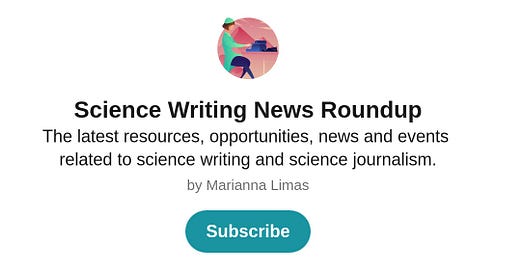✍️Science Writing News Roundup #29 (February 2, 2021)
How to create, grow and monetize newsletters + An example of COVID-19 vaccine hesitancy reporting done right + How to kick-start your freelancing career during the pandemic
🌈 Opportunities
Newsletter strategies for journalists: how to create, grow and monetize newsletters. During this four-week massive open online course, which will be held from February 22 to March 21, 2021, students will learn the fundamental skills required to launch and maintain a newsletter.
The Institute for Journalism & Natural Resources will hold a five-hour workshop for editors on March 3, 2021 to explore questions of environmental racism, social equity and the problematic lenses through which these stories get told.




📚 Tips
How to kick-start your freelancing career during the pandemic: From budgeting to networking, four journalists share their best tips to help you take that first step on your freelancing journey!
How editors can support writers with mental health conditions. According to April Reese, editors can work to create a culture of openness and empathy when it comes to mental health. They can learn how to recognize the signs of common mental health conditions and how to reach out when a writer seems to be struggling.
Reporting tricks and communication tips for scientists in government. Sarah Loftus had the exciting opportunity to write environmental science stories for a newspaper as an AAAS Mass Media Fellow. Trying to keep pace in a virtual newsroom taught her some reporting tricks and communication lessons that she thinks are also useful for scientists working in government.
Reporting lessons for journalists from the first year of Covid-19 data and science in the news. A new report offers a series of tips for journalists to bring into the short- and long-term future of data, health and science reporting, including the following: 1) Tap into the power of citizen science, 2) “Geo-customize” data to make them personally relatable, 3) Collaborate with other newsrooms, and more.
An example of COVID-19 vaccine hesitancy reporting done right. How do you report on vaccine hesitancy responsibly, focusing on what’s important and relevant, without inadvertently increasing it? Fran Kritz’s article at NPR reports on a tried-and-true, evidence-based strategy that years of research have shown to be effective: using trusted messengers to deliver health information.
⏰ Resources
Resources for covering the COVID-19 and variants story. Here are a few resources to help with your reporting.
Lessons for reporting on COVID-19 variants. What do we know about the COVID-19 variants? Do the new strains respond differently to vaccines? Bernardo Gutierrez, a researcher at the University of Oxford, joined ICFJ for a webinar to discuss.




🍿 Videos
Covering the COVID-19 vaccine: What journalists need to know (Knight Center Courses)
Understanding the Vaccine Race: A Virtual Conversation with Jon Cohen (Science Writers in New York)
Women are missing from our coverage, so how do we fix it? (International Center for Journalists)
Health Reporting: Finding Data and Verifying Expert Claims (International Center for Journalists)
Prague Media Point 2020 Conference: Climate Change and Journalism
🌏 Events
What Do We Know (and Not Know) about COVID-19 Variants and Vaccines? A Virtual Conversation with Dr. Mirella Salvatore (February 3, 2021)
Freelancing Business Basics for Science Writers (February 4, 2021)
Reporting on COVID-19 Vaccines at the Intersection of Science and Politics (February 5, 2021)
People and Microbes on the Move: an Evening with Science Journalist and Author Sonia Shah (February 5, 2021)
Story Collider’s Introductory Storytelling Workshop: This introduction to science storytelling is fun, fast, and very hands-on (February 8, 2021)
AAAS 2021 Annual Meeting (February 8-11, 2021)
Medium in Conversation: Vaccine Questions, Answered with Tara Haelle, a freelance science and health journalist (February 9, 2021)
AAAS Kavli Science Journalism Awards Ceremony (February 9, 2021)
Journalism, Science, and Policy: Communicating Risk and Relevance (February 11, 2021)




⛳️ Career opportunities
Science Writer, STAT, Boston, MA
Communications Interns, The European Geosciences Union, Germany
Health Science Reporter, Inverse, Remote
Science Writer & Communication Specialist, Lifeology, US-based
Science Writing Intern, New America, Washington, DC
Summer Intern, Spectrum, US-based
Science Writing Editor, Great Minds, Remote
Associate Editor, Custom Media, Nature Research, London or New York
Scientific Writer, IBM Research, US-based
Diverse Voices in Science Journalism (DVSJ) Intern, AAAS, US-based
More jobs 👉Science Writing News Roundup #28
👉 Don’t miss any updates from the Science Writing News Roundup:
Worried you missed something? See previous newsletters here. What would you like to see in the newsletter? Please send me your suggestions by replying to this email: sciencewriting@substack.com😃
If you liked this post, share it with your friends 💙


